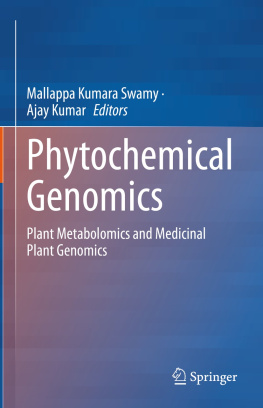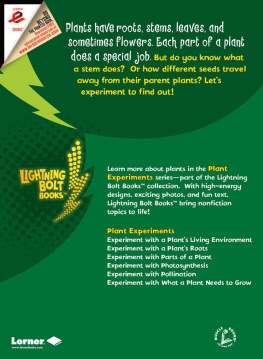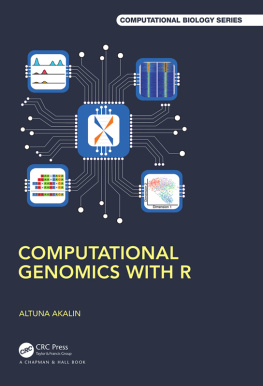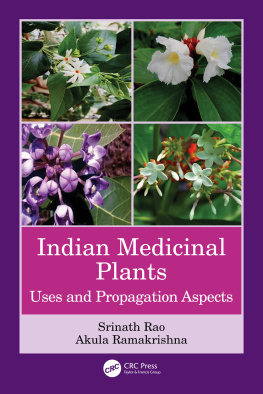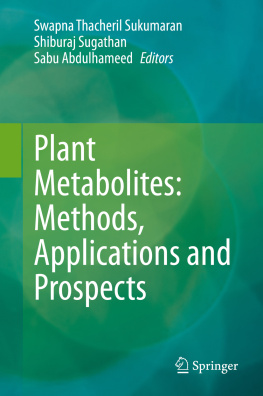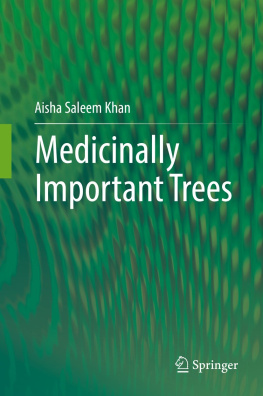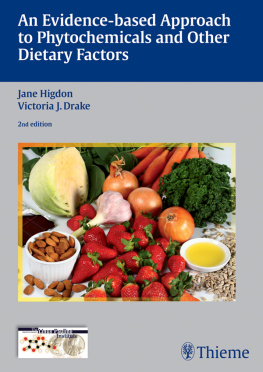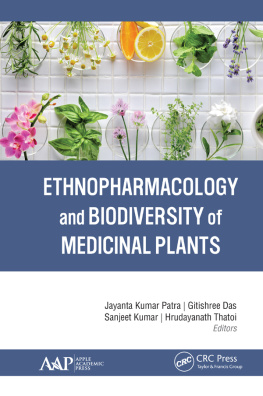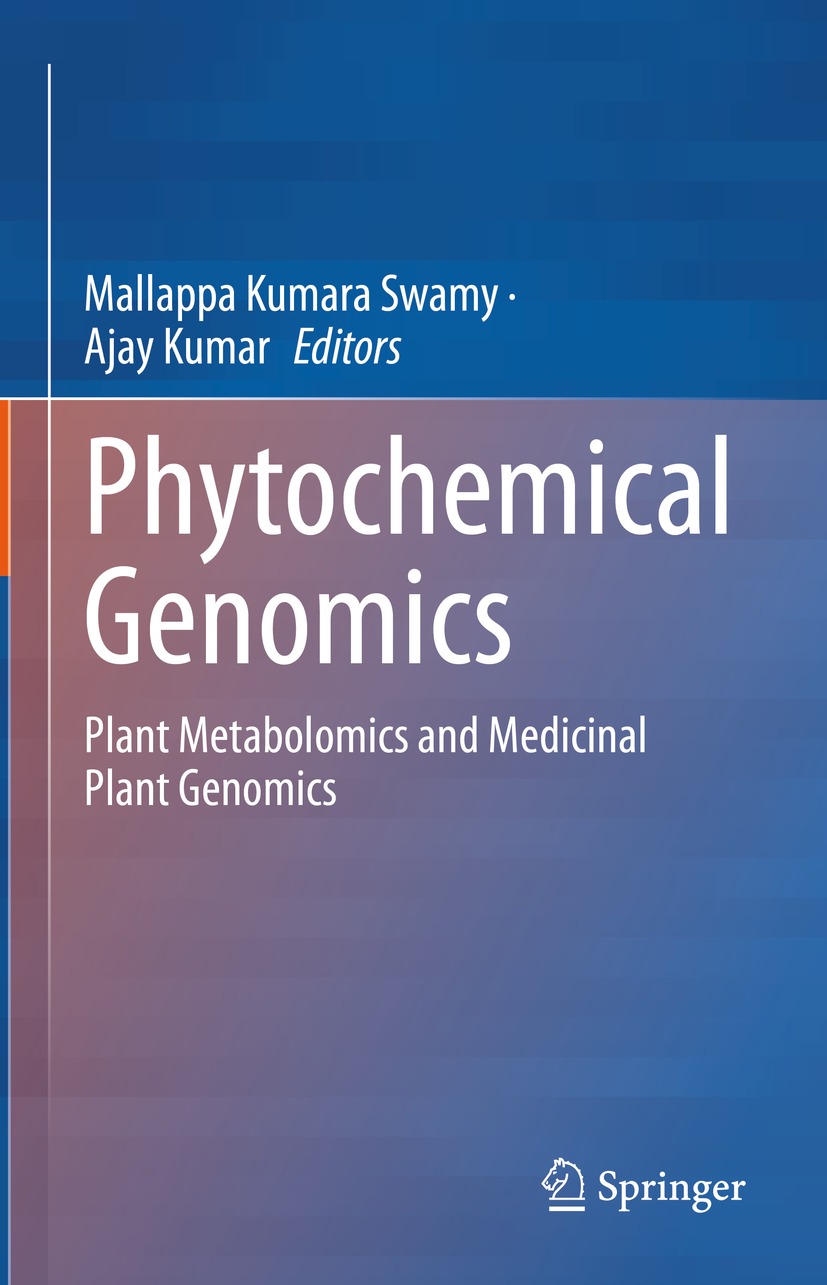Editors
Mallappa Kumara Swamy
Department of Biotechnology, East West First Grade College of Science, Bengaluru, Karnataka, India
Ajay Kumar
Department of Plant Science, School of Biological Sciences, Central University of Kerala, Kasaragod, Kerala, India
ISBN 978-981-19-5778-9 e-ISBN 978-981-19-5779-6
https://doi.org/10.1007/978-981-19-5779-6
The Editor(s) (if applicable) and The Author(s), under exclusive license to Springer Nature Singapore Pte Ltd. 2022
This work is subject to copyright. All rights are solely and exclusively licensed by the Publisher, whether the whole or part of the material is concerned, specifically the rights of translation, reprinting, reuse of illustrations, recitation, broadcasting, reproduction on microfilms or in any other physical way, and transmission or information storage and retrieval, electronic adaptation, computer software, or by similar or dissimilar methodology now known or hereafter developed.
The use of general descriptive names, registered names, trademarks, service marks, etc. in this publication does not imply, even in the absence of a specific statement, that such names are exempt from the relevant protective laws and regulations and therefore free for general use.
The publisher, the authors, and the editors are safe to assume that the advice and information in this book are believed to be true and accurate at the date of publication. Neither the publisher nor the authors or the editors give a warranty, expressed or implied, with respect to the material contained herein or for any errors or omissions that may have been made. The publisher remains neutral with regard to jurisdictional claims in published maps and institutional affiliations.
This Springer imprint is published by the registered company Springer Nature Singapore Pte Ltd.
The registered company address is: 152 Beach Road, #21-01/04 Gateway East, Singapore 189721, Singapore
Preface
Plants are considered as the natural chemical factories because they produce a plethora of phytochemicals. Phytochemicals are important for the growth, development and defence of plants. Besides this, many phytochemicals particularly specialized metabolites are known to possess multiple medicinal and nutraceutical properties. Many of these phytochemicals have industrial uses. The biosynthesis of many phytochemicals is highly complex and involves many genes and other micro-regulators, including noncoding RNAs. Due to multiple benefits of these phytochemicals, recently, there is an increase in the interest towards identifying the phytochemicals and their underlying genes. The advancements in the next-generation technologies have resulted in the sequencing of a large number of medicinal plants that have contributed towards the understanding of genes that are responsible for producing a diverse phytochemical in plants. The genes-to-metabolites connections have been explicated, specifically by employing the combined studies of transcriptomes and metabolomes. These approaches are used to understand the functional genomics and the production of phytochemicals in major crops, and also in medicinally valued plants.
Increasing realization of the importance of plant-based bioactive compounds and the quest for finding their genes and other regulatory elements have led to the evolution of Phytochemical genomics as an emerging interdisciplinary area of research, which employs genomics and associated -omics technologies, such as transcriptomics, proteomics and metabolomics for the investigation of genomic basis of phytochemicals production and their functions. This field further elucidates the phytochemical biosynthetic pathways and their regulatory aspects. Recent findings have shown a great promise in identifying novel genes that are responsible for the biosynthesis of bioactive compounds in medicinal plants. Further, advancements in computational bioinformatics have accelerated the process of discovery of new bioactive compounds, acquisition of genomic, transcriptomic and metabolomics data and its analysis. Increasing integration of -omics data makes it possible now to understand gene-metabolite networks in medicinal plants, which further enable us to better understand the synthesis, evolution and storage of specialized metabolites within the plants. The convergence of the results of genomics and metabolomics with the recent revolutionary technologies, such as gene editing can aid and fasten the improvement programs aimed at the medicinal plants for the metabolites of commercial and economic importance.
Phytochemical genomics have led to several progressive outcomes. For instance, co-expression investigation of Catharanthus roseus transcriptome data recognized candidate genes that are responsible for the biosynthesis of monoterpenoid indole alkaloid. Similarly, scientists have identified two cytochrome P450 genes in Glycyrrhiza uralensis (licorice) for the biosynthesis of a sweetener saponin, glycyrrhizin. This has allowed the possibility of producing metabolites in other organisms, for example, microbial production of glycyrrhetinic acid. The genes involved in the biosynthesis of morphine in Papaver somniferum have been recognized by omics approaches. A polyketide synthase enzyme responsible for synthesizing olivetolic acid has been identified in Cannabis sativa. The candidate genes involved in the biosynthetic pathways of alkaloids and anthraquinones have been identified using differential transcriptomics and metabolic profiling for engineered cultured cells.
It is noteworthy to mention that the biosynthetic genes in plants are located in the genome, contrasting to microbial genes, where they are clustered together on the genome. Moreover, the expression of these genes is highly regulated. Nevertheless, collective evidences indicate that the genes of few biosynthetic pathways form gene clusters in plant genomes. This enables the detection of functional genes more easily and also offers more comprehensive understandings on evolution and function of specialized metabolites. More research is happening in this advanced scientific area to decipher the role of genes and their products to modulate the biosynthesis of plant secondary metabolites. Thus, surprising discoveries and uses can be achieved in this new field in coming years.
This book titled Phytochemical Genomics: Plant Metabolomics and Medicinal Plant Genomics is the first book devoted to the phytochemical genomics of medicinal plants. This book intend to present the latest findings in this area. This book is divided into four sections. The first section introduces the readers to phytochemicals, their diverse sources, roles, applications, bioprospecting, and technological advancements that aid their analysis. The second section introduces the concept of phytochemical genomics and its emergence. It further provided in-depth information on the integration of various -omics technologies for the analysis of the genes that regulate the important phytochemicals. It also provides the metabolomic diversity, databases relevant to medicinal plants and strategies to enhance the production of the metabolites using the information obtained from phytochemical studies. The third section deals with linking phytochemical genomics with recent revolutionary gene editing technologies including CRISPR/Cas for the improvement of the medicinal plant crops. The fourth section discusses the applications of phytochemical genomics such as medicinal plant stress biology, DNA barcoding and computational integration. This book will serve as a reference manual of phytochemical genomics for future. The book gives updated information on the emergence of phytochemicals as a new interdisciplinary area of research. The book will be helpful to young researchers, graduate students and scientists.

